For the 2025 school year, there is 1 public elementary school serving 178 students in Ray Unified District (4438) School District. This district's average elementary testing ranking is 2/10, which is in the bottom 50% of public elementary schools in Arizona.
Public Elementary School in Ray Unified District (4438) School District have an average math proficiency score of 12% (versus the Arizona public elementary school average of 34%), and reading proficiency score of 27% (versus the 40% statewide average).
Minority enrollment is 58% of the student body (majority Hispanic), which is less than the Arizona public elementary school average of 67% (majority Hispanic).
Overview
This School District
This State (AZ)
# Schools
2 Schools
1,644 Schools
# Students
349 Students
761,365 Students
# Teachers
24 Teachers
33,884 Teachers
Student : Teacher Ratio
15:1
15:1
District Rank
Ray Unified District (4438) School District, which is ranked within the bottom 50% of all 607 school districts in Arizona (based off of combined math and reading proficiency testing data) for the 2021-2022 school year.
The school district's graduation rate of 70-79% has decreased from 90% over five school years.
Overall District Rank
#492 out of 631 school districts
(Bottom 50%)
(Bottom 50%)
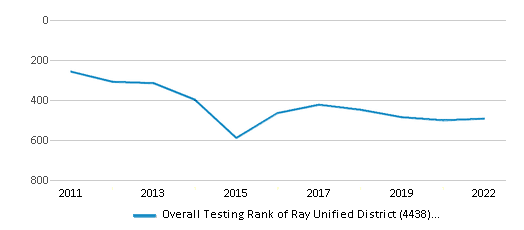
Math Test Scores (% Proficient)
10-14%
35%
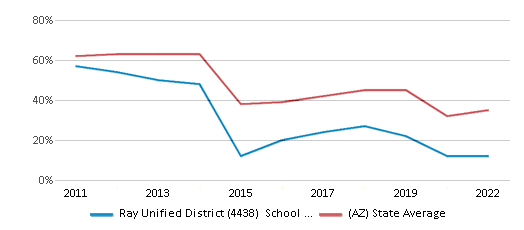
Reading/Language Arts Test Scores (% Proficient)
25-29%
40%
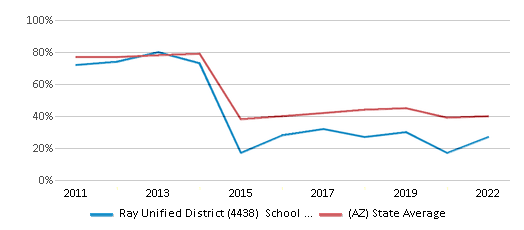
Science Test Scores (% Proficient)
6-9%
24%
Graduation Rate
70-79%
77%
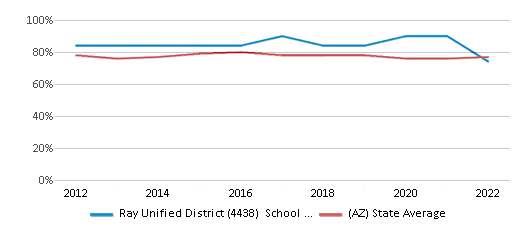
Students by Ethnicity:
Diversity Score
0.56
0.66
# American Indian Students
8 Students
37,923 Students
% American Indian Students
2%
5%
# Asian Students
4 Students
26,420 Students
% Asian Students
1%
4%
# Hispanic Students
185 Students
360,618 Students
% Hispanic Students
53%
47%
# Black Students
4 Students
44,373 Students
% Black Students
1%
6%
# White Students
142 Students
254,564 Students
% White Students
41%
33%
# Hawaiian Students
1 Student
2,710 Students
% Hawaiian Students
n/a
n/a
# Two or more races Students
5 Students
34,724 Students
% of Two or more races Students
2%
5%
Students by Grade:
# Students in PK Grade:
16
18,007
# Students in K Grade:
24
73,126
# Students in 1st Grade:
18
78,842
# Students in 2nd Grade:
32
82,537
# Students in 3rd Grade:
25
80,342
# Students in 4th Grade:
18
82,920
# Students in 5th Grade:
16
83,092
# Students in 6th Grade:
29
83,167
# Students in 7th Grade:
17
67,887
# Students in 8th Grade:
30
68,279
# Students in 9th Grade:
29
9,715
# Students in 10th Grade:
29
10,079
# Students in 11th Grade:
45
10,225
# Students in 12th Grade:
21
12,604
# Ungraded Students:
-
543
District Revenue and Spending
The revenue/student of $16,418 is higher than the state median of $11,421. The school district revenue/student has stayed relatively flat over four school years.
The school district's spending/student of $17,203 is higher than the state median of $11,323. The school district spending/student has stayed relatively flat over four school years.
Total Revenue
$6 MM
$12,837 MM
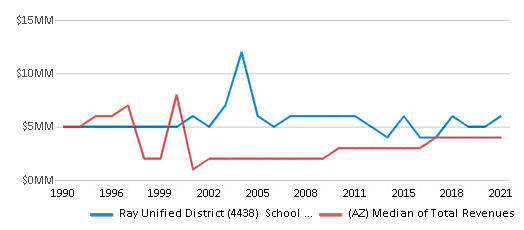
Spending
$6 MM
$12,727 MM
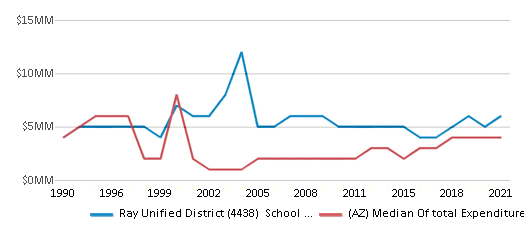
Revenue / Student
$16,418
$11,421
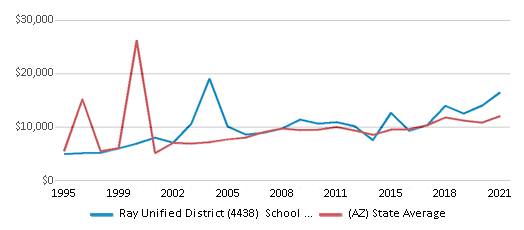
Spending / Student
$17,203
$11,323
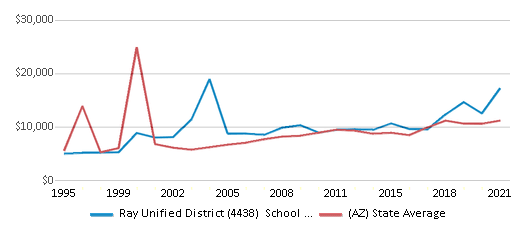
Best Ray Unified District (4438) School District Public Elementary Schools (2025)
School
(Math and Reading Proficiency)
(Math and Reading Proficiency)
Location
Grades
Students
Rank: #11.
Ray Elementary School
(Math: 10-14% | Reading: 25-29%)
Rank:
Rank:
3/
Bottom 50%10
651 Sen. Chastain Dr.
Kearny, AZ 85137
(520) 363-5515
Kearny, AZ 85137
(520) 363-5515
Grades: PK-6
| 178 students
Recent Articles

Year-Round Or Traditional Schedule?
Which is more appropriate for your child? A year-round attendance schedule or traditional schedule? We look at the pros and cons.

Why You Should Encourage Your Child to Join a Sports Team
Participating in team sports has a great many benefits for children, there is no doubt. In this article you will learn what those benefits are.

White Students are Now the Minority in U.S. Public Schools
Increasing birth rates among immigrant families from Asia and Central and South America, combined with lower birth rates among white families, means that for the first time in history, public school students in the United States are majority-minority. This shift in demographics poses difficulties for schools as they work to accommodate children of varying language abilities and socio-economic backgrounds.





